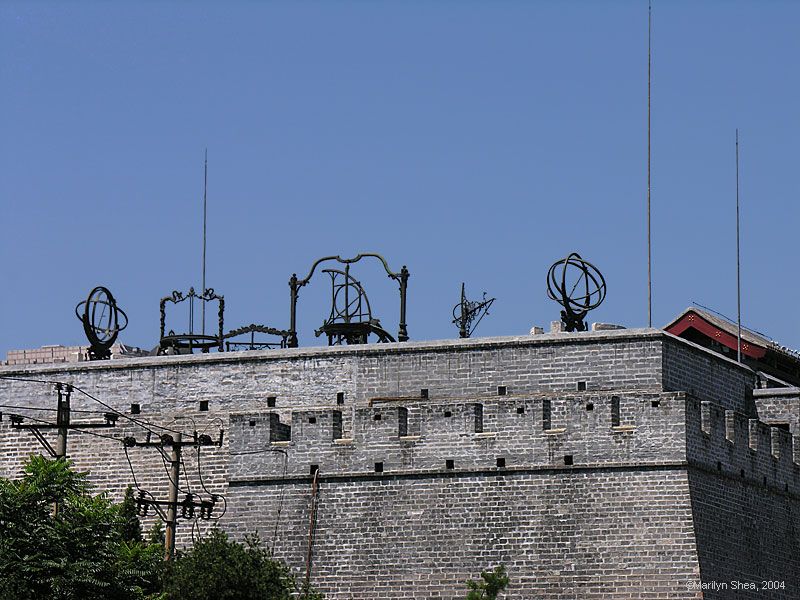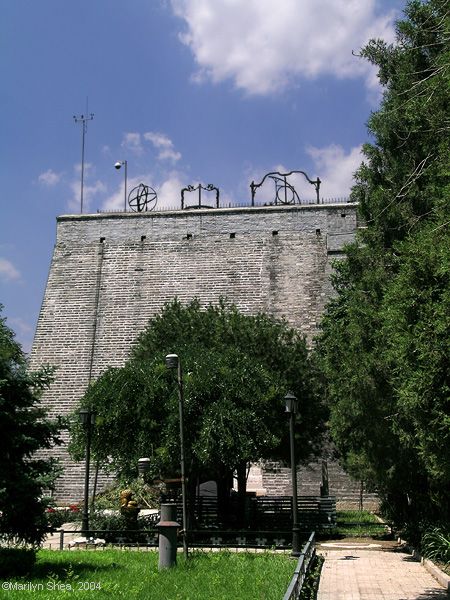 |
| In 1279, at the beginning of the Yuan Dynasty (1279-1368), Wáng Xún (王恂) and Guō Shǒujìng (郭守敬) built an observatory near present day Jianguomen to work on observations to revise the calendar. Guō Shǒujìng (郭守敬) invented the simplified armilla shown in the diagram above on the far right in back of the sun shadow hall and in front of the main courtyard building on the left. The simplified armilla shown on the grass at the right is on loan to another museum. He is also responsible for the square table shown in the center of the courtyard and improvements to the gnomon shown as a pillar near the grass courtyard in the lower left.
In 1442, in the early part of the Ming Dynasty (1368-1644), during the reign of Emperor Zhèngtǒng (正統), a new observatory was built near the site of the first. With modifications made in the later Ming and during the Qing Dynasty, it survives today. Originally the observatory was integrated into the outer wall of Beijing. The form of the observatory is defined by the building techniques used for battlements. A large mound of earth was piled up and then an outer shell of bricks or granite was mortared into place. The sloping sides made it impervious to earthquakes and the solid interior prevented successful attacks from fire or shelling. Access to the top was provided by an exterior stairway. Today there is also an interior stairway leading to the top. In the Ming Dynasty, the observatory had an armillary sphere, abridged armilla, and a celestial globe in addition to the standard gnomon. The tower served as a gnomon itself and is called the Sun's Shadow Hall. In 1644, the Manchus conquered China and established the Qing Dynasty. When they took over Beijing, they changed the name of the observatory from Guān Xiàng Tǎi 观象台 to Tiān Wén Tǎi 天文台. Today it is officially known as Běijīng Guān Xiàng Tǎi (北京古观象台) although unofficially it is often called Gǔdài Tiān Wén Tǎi (古代天文台), both mean Ancient Observatory. During the reign of Emperor Kangxi, between 1667 and 1674, six additional instruments designed by Ferdinand Verbiest were added: equatorial armilla, ecliptic armilla, quadrant, celestial globe, sextant, and altazimuth. They are described on the following pages. Two additional instruments were added later, the azimuth theodolite and the new armilla. Below is a picture taken in 1895 by William Henry Jackson showing the instruments on top of the sun's shadow tower at the end of the Qing Dynasty (from the Library of Congress transportation archives). The most interesting part of the picture is the background of open farm land. The observatory now abuts one of the busiest expressways in the world and is surrounded by complexes of modern skyscrapers. |
 William Henry Jackson, Library of Congress (wtc 4a03251) William Henry Jackson, Library of Congress (wtc 4a03251) |
| Below is a series of pictures showing the observatory looking much as it did over 100 years ago. |
 |
 |
 |
 |
http://hua.umf.maine.edu/China/beijing2.html
Last
update: May 2007
© Marilyn Shea, 2007